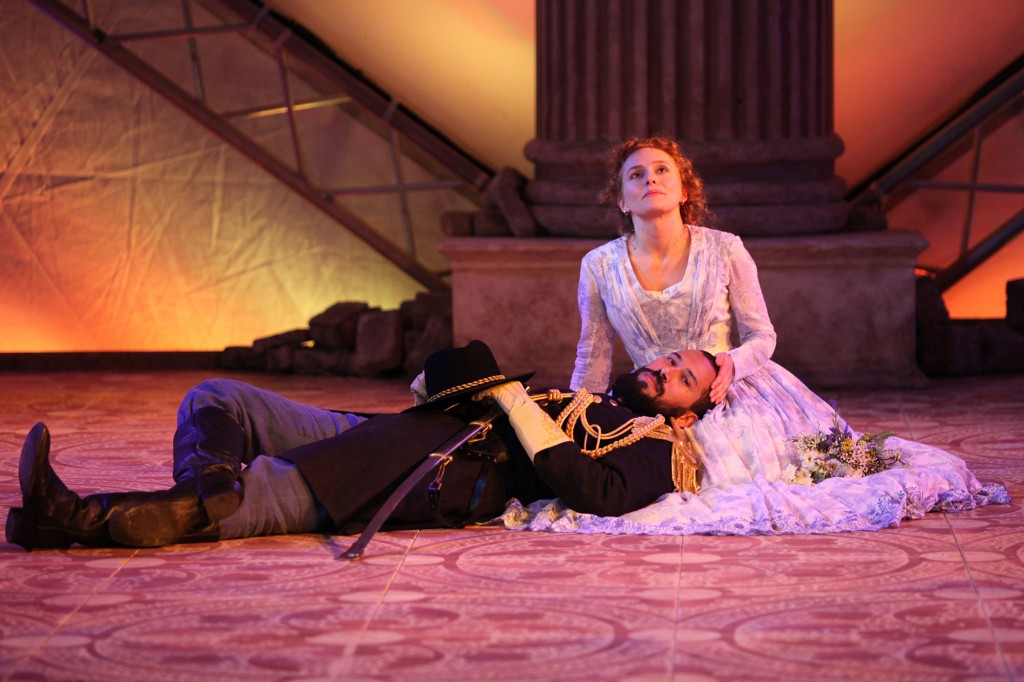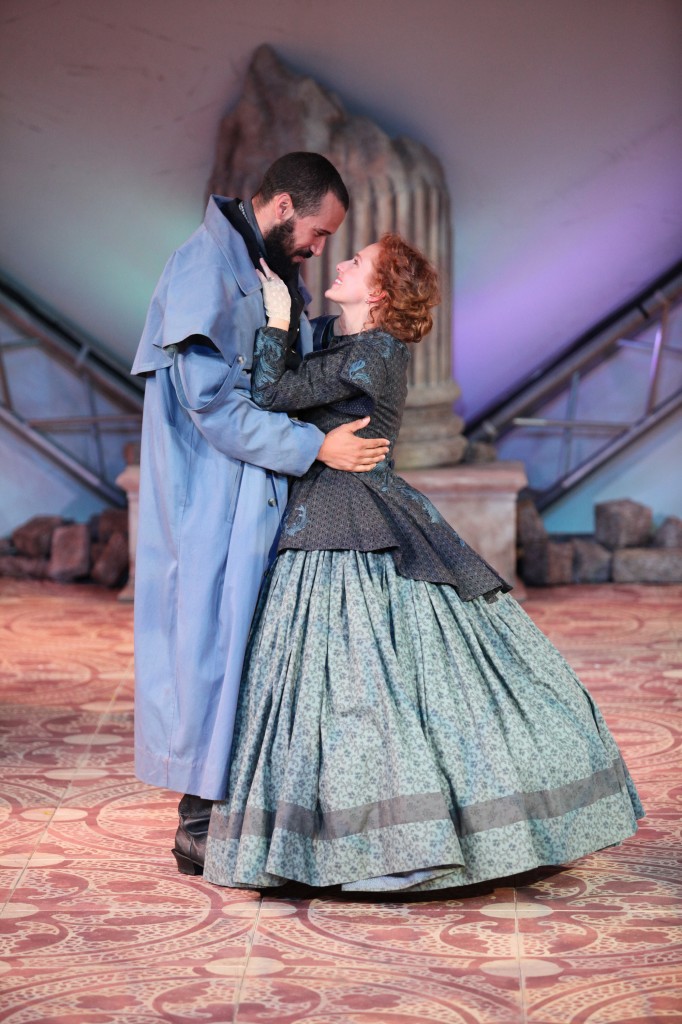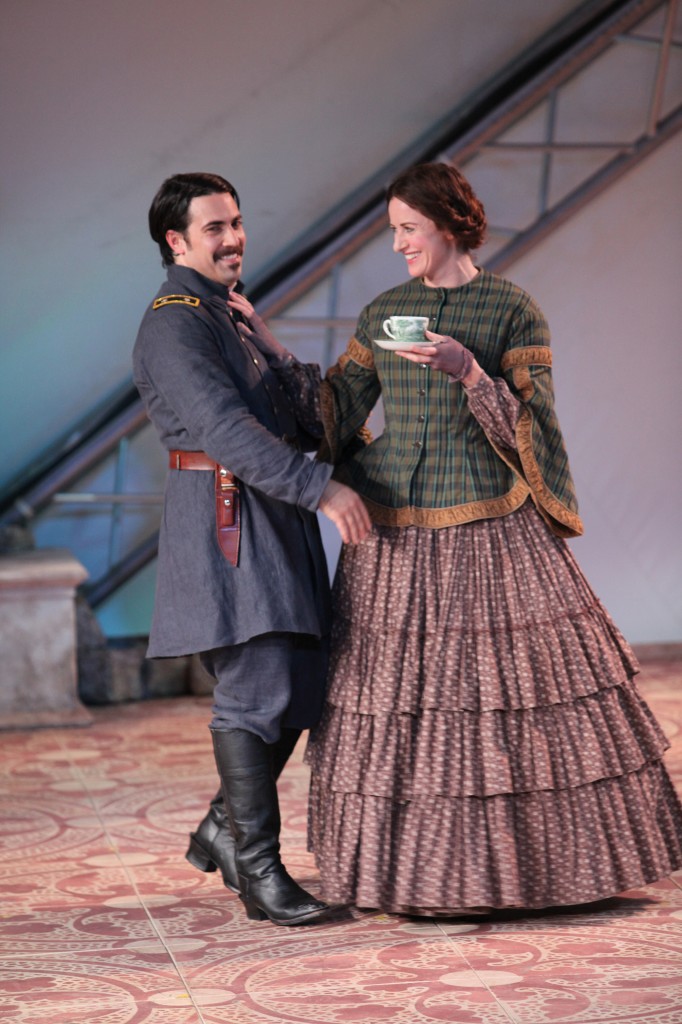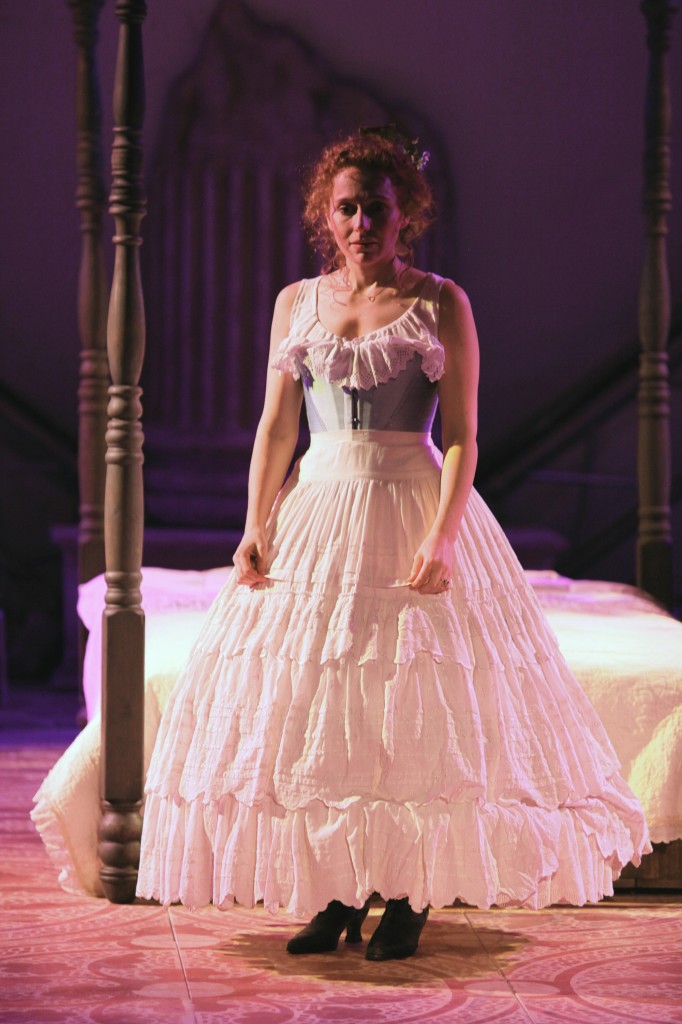
Credit: David Blue
At Bard on the Beach until September 17, 2016
604-739-0559/bardonthebeach.org
Posted July 8, 2016
In Shakespeare’s tragedy, Othello is warned by Iago against jealousy, “the green-eyed monster”, but Iago has already sown the seeds and has been assiduously feeding “the monster” in retaliation for being overlooked for promotion. As well, there’s the unlikely possibility that Othello has been between the sheets with Emilia, Iago’s wife. Even if it’s a false rumour, Iago’s pride is wounded. What if he is perceived as a cuckold? Added to Iago’s complex motivation is racism; Othello is black, Desdemona is fair and theirs is a marriage not approved of in Shakespeare’s time or during the American Civil War, the period in which director Bob Frazer sets this production.
It’s surprising – and to Frazer’s credit – how quickly we forget that Shakespeare located the play in Venice not Charleston, South Carolina; how readily we accept Mara Gottler’s gorgeous ‘bird-cage’, Scarlett O’Hara-ish gowns and military uniforms; and how easily we enjoy the incidental music – with banjo – including “Dixie”, so synonymous with the American South. If you accept that Othello’s major vulnerability is his feeling of racial inferiority, Frazer’s relocation of the play makes sense.

Costume design: Mara Gottler
Credit: David Blue
Set designer Amir Ofek was charged with designing a single set for both Othello and Pericles – two plays set in very different locations. Crumbling, truncated marble columns form a backdrop to the lightly raked mosaic tile floor; furniture is moved on and off as required. Remarkably, two coffin-like boxes are transformed, with the addition of white silk sheets, into the canopied bed on which Desdemona dies at the hand of Othello.
Luc Roderique’s Othello is sublimely charismatic: tall, athletically built with a trim black beard and mustache. In the early part of the play, Roderique’s smile, boyish charm, virile physicality and boundless enthusiasm leave no doubt that Desdemona would fall in love with this Moor. By the end of the play, however, Roderique seems to have shrunk in stature, his eyes have lost their sparkle and his body language is that of a man completely undone.
Desdemona, excellently portrayed by Kayla Deorksen, goes through a parallel disintegration. Deorksen simply effervesces at the beginning; her Desdemona is clearly, delightfully in love. But as Othello falls under Iago’s spell, Deorksen finds maturity and gravitas in Desdemona.
Iago’s ploy is to convince Othello that Cassio, one of his lieutenants, has been intimate with Desdemona. Actor Jeff Gladstone is an interesting choice in the role; his Cassio is longhaired, silly, a drunkard and not one to whom Desdemona might be attracted. But Gladstone has charm and Desdemona has an affection for this Cassio such as she might have for a ne’er do well cousin. The pity is that Othello cannot distinguish between Desdemona’s affection for and – what Iago implies – lust for Cassio.

Credit: David Blue
Strange in this play is that Iago’s wife Emilia (Luisa Jojic), who doesn’t have a lot to say throughout the play, comes in at the end with a lengthy, scorching diatribe against men in general: “The ills we [women] do, their [men’s] ills instruct us so.” Later, she condemns Othello and Iago and berates herself for her part in the tragedy. Strange, too, is that she plays along with Iago, seeking his attention, but fails to see, until it’s too late, how she is complicit.
The play could be called Iago for, really, he is the driving force. Kayvon Kelly is compact and dynamic, rendering a Iago who ruthlessly pursues revenge against his former friend. We see Iago’s gears shifting as he plans the successive moves in his clearly stated desire to destroy Othello. Kelly provides transparency – as much as it’s possible – into the mind of one of theatre’s most reviled villains.
Director Frazer’s fresh vision and strong performances by this cast of twelve make this a memorable Othello. If Desdemona’s death doesn’t bring tears to your eyes, Othello’s frailty might.

Credit: David Blue

